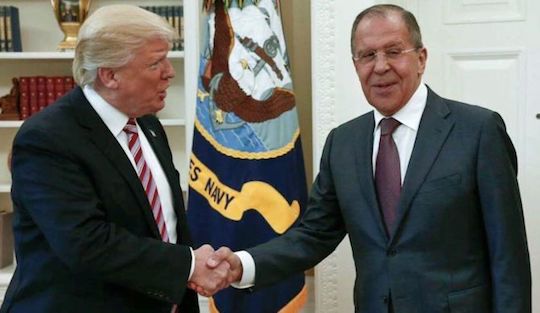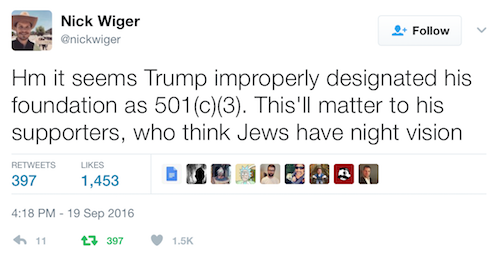Yesterday, President Trump divulged classified US intelligence during a meeting with Russian diplomats Sergey Kislyak and Sergey Lavrov.1 According to the Washington Post, the disclosure pertained to a plot by ISIS to smuggle bombs onto planes in laptops. Of less concern than the material itself is the possibility that its divulgence could compromise intelligence sources and methods, since “a Middle Eastern ally that closely guards its own secrets provided the information.” There’s also the aspect of this situation where Trump actually does on purpose exactly what he attacked Hillary Clinton for potentially doing by accident with her emails. So this is the scandal that finally undoes the Trump administration, right? Right? [crickets][racist crickets]
Yesterday, National Security Advisor H.R. McMaster issued what the papers are calling a “carefully worded denial” of the Post story, which is a term of art for a denial that doesn’t really deny the allegations at hand. Quote:
I was in the room; it didn’t happen. At no time—at no time—were intelligence sources or methods discussed, and the president did not disclose any military operations that were not already publicly known.
That’s not what the Washington Post reported, of course. They didn’t say that the president disclosed military operations or discussed intelligence sources. They only said that he revealed classified information—something McMaster did not strictly deny. On Twitter this morning, Trump seemed to undercut McMaster’s denial, saying he had “the absolute right” to share “facts pertaining to terrorism and airline flight safety” with the Russians.
Lawfare agrees with that assessment, noting the president can share classified information at will. But will any of these precise arguments—from McMaster’s not-technically-false denial to the notion that POTUS operatively declassifies information in the act of sharing it—influence Trump’s core supporters? I refer to this tweet from September, which captures something maddening about his political career:
Whenever Trump does something awful, I briefly think it will end his presidency. Then I remember that only a fraction of his supporters will hear about it, and a fraction of them will believe it actually happened, and a fraction of them will understand its implications. That second cut is especially substantial. Here’s Russian foreign ministry spokeswoman Maria Zakharova, who said that the whole WaPo report was “fake”:
Guys, you are again reading American newspapers? You should not read them. They can be used in various ways, but there’s no need to read them—lately, this is not only harmful, but dangerous.
This may be the most Russian thing anyone has said since a dude in Pittsburg told me that putting pepper in my vodka would make me hairier. What’s terrifying is that we get approximately the same advice the Trump administration. The news is fake—particularly the news about Donald Trump, who is the only reliable source of information on that subject.
So I want to believe this news will finally undo the Trump administration, but I am succumbing to epistemic nihilism. It’s not that I believe nothing is true. I’m just becoming concerned that nothing true matters. In the end, that may be the greatest threat the present administration poses to anybody.





